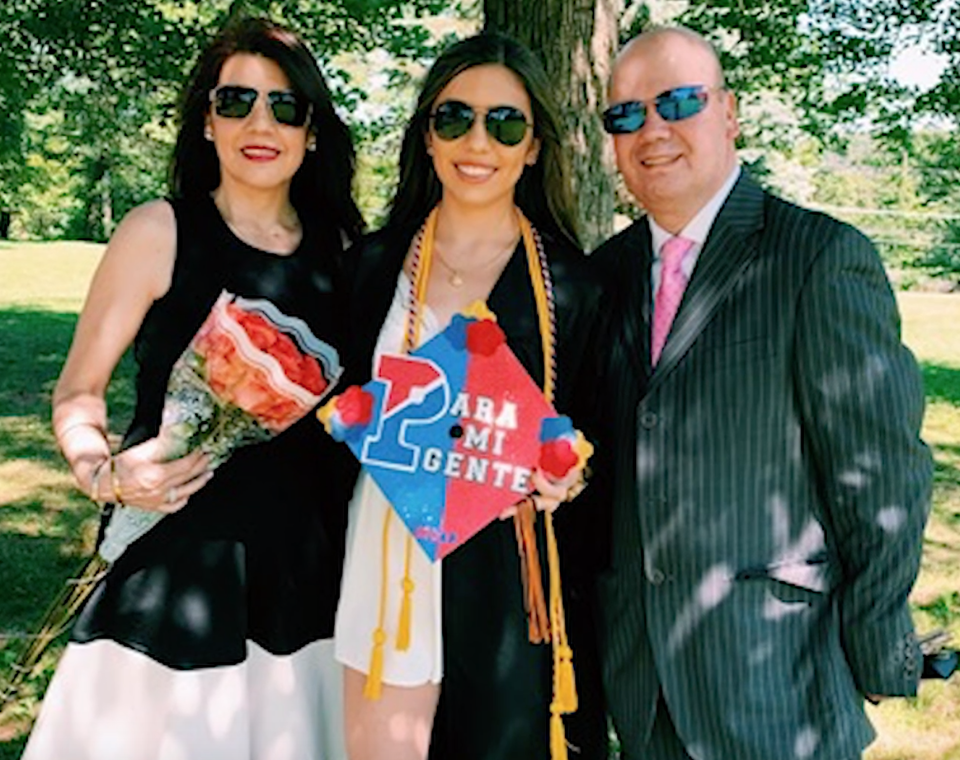Latinx Heritage Month: ‘You’re not smart enough to go to college’: How first-generation Latinx students are overcoming the odds in pursuit of higher education
Yahoo News brings you this exclusive video in celebration of Latinx Heritage Month.
Among the first-time college goers who are settling in to their new surroundings is University of Pennsylvania freshman Michelle Mahecha Perez. Her journey to the Ivy League was no easy feat. The overall acceptance rate for Perez’s UPenn class of 2023 was a record-low 7.4 percent. And as a low-income Latina and first in her family to go to college, Perez had additional obstacles to overcome.
When she was growing up, her mother emphasized the importance of education and how it has the possibility to change her life. That’s why she will remember March 28, 2019 — the day she was accepted to UPenn — as the “best day” of her life.
Her parents immigrated to the United States 20 years ago from Colombia. “They obviously had to leave behind their family, their jobs, life as they knew it. They had to start over completely, and they had this dream of having a child that would one day be bilingual and have the opportunities that they didn’t,” Perez said in an interview with Yahoo News. “I love my parents, they’ve been the best support system, but obviously it’s hard because neither of them went to college.”
“When I was applying to colleges ... I had no idea where to start,” Perez said. She also attended a public high school that didn’t offer specific support for students applying to college. “I would try my hardest to navigate the things that I did know, like the SAT, but my parents couldn’t afford tutors. They couldn’t afford to send me to a prep class, so I had to do it all on my own.”
Navigating the college application process, Perez battled some inner thoughts: “I always had this thing in the back of my head of like, ‘You can't afford college.’ And there was constantly this idea of ‘Oh, well you’re first-generation, like you’re not smart enough to go to college.’”

According to a Pew Research study, Hispanic college enrollment in public and private colleges increased 180 percent from 1.3 million in 1999 to 3.6 million in 2016. Even though progress is being made, Hispanics still lag behind blacks, Asians and whites in obtaining four-year degrees, according to Pew.
“Many Latino students are first-generation college goers, and that brings with it multiple opportunities and challenges. The challenges are that you really have to be prepared to be very resourceful,” Sarita Brown told Yahoo News. Brown is the president and co-founder of Excelencia in Education, a nonprofit dedicated to accelerating Latino success in higher education.
Perez’s turning point came when she discovered a flyer for Latino U College Access, an organization that helps first-generation low-income Latinx students attend college. “Latino U really helped my [family] understand what college is in America, and how the process works. … My relationship with my parents has only flourished since then because they’ve seen what it really takes to get here,” said Perez.
“For Latinx students or for students of color period, I think it’s kind of an uphill battle because we’re trying to function in a system that wasn’t necessarily made for us,” Mara Dorta told Yahoo News. Dorta, who has a master’s degree from New York University, experienced a similar journey to Perez being the first in her family to navigate the college application process.
“My parents immigrated here from Puerto Rico back in the ’60s. … They made a family in Bushwick, Brooklyn, and we survived all six of us in a two-bedroom tenement.” She attended a public high school and faired well academically, but wasn’t given the tools to prepare for an exam like the SAT. Discouraged by her guidance counselor, she only applied to two state schools and got into one in Buffalo, N.Y. “It was a terrible fit. … I had no resources on campus. I didn’t know where to go, who to reach out to, to try to find community,” Dorta recalled. She ended up leaving in 2000 and felt like “a complete failure.”
Dorta reconnected with a friend from Buffalo who was working at New York University and told her about tuition remission. “That’s where my journey kind of really blossomed. … I managed to finish my bachelor’s in four years working full-time and part-time.” Seven years after she received her bachelor’s, she earned an M.A. from NYU in educational leadership, politics and advocacy.

“I’m now the director of college access and leadership at the YWCA Brooklyn. I get to work with amazing young women from all over Brooklyn, just like me still figuring this out, whose parents maybe don’t know the system, but we’re helping them navigate it.”
“Approximately 97 percent of the Latino students in America today are U.S. citizens or permanent residents, and that number has not changed,” said Brown. “It’s worth talking about it because there is so much emphasis on immigration, and the emphasis unfortunately has not been positive. … The politics aside, framing of borders aside, we are part of this country’s life force, and as a student population we are eager to participate. … The next generation of students is essential to the life of this country.”



